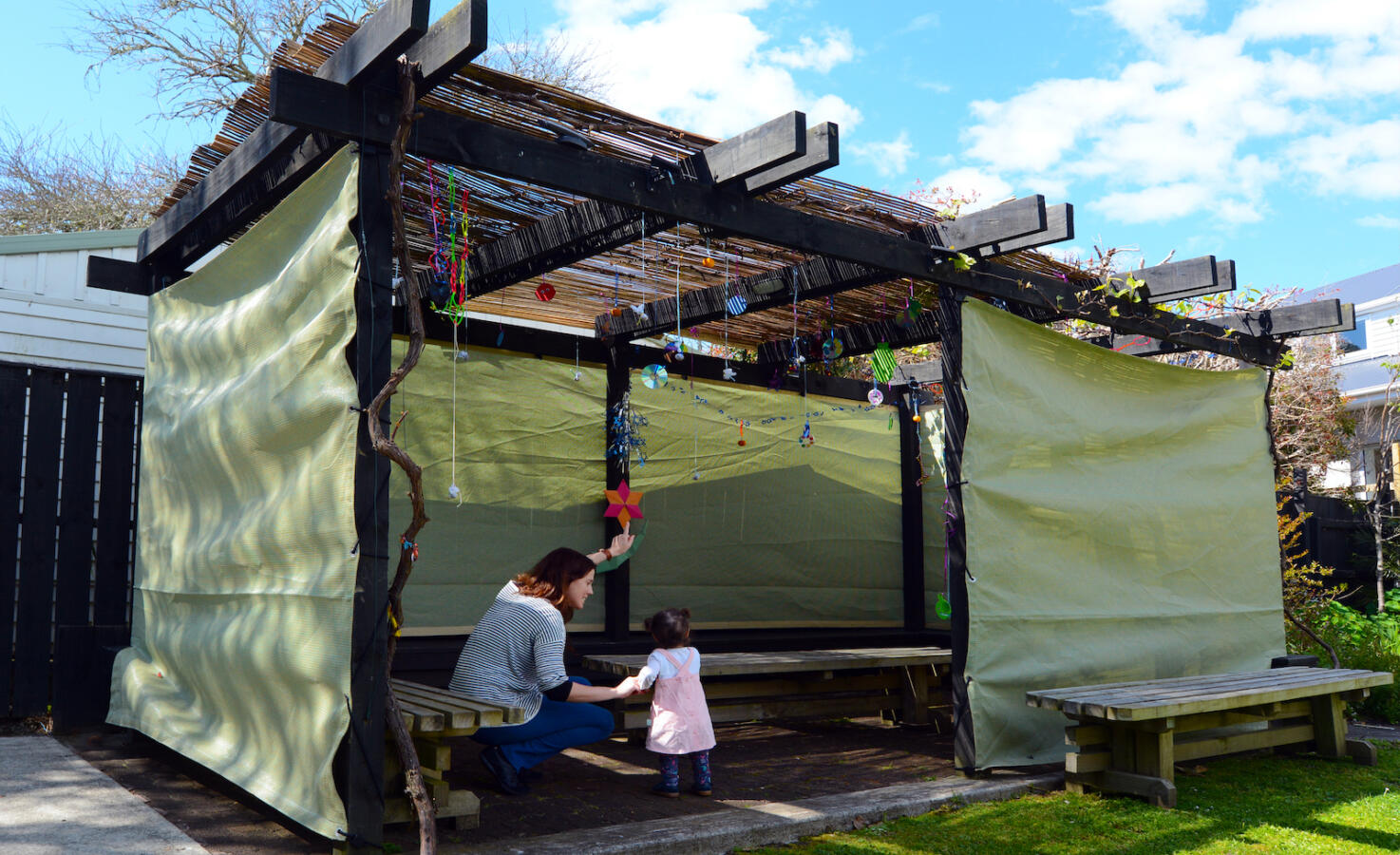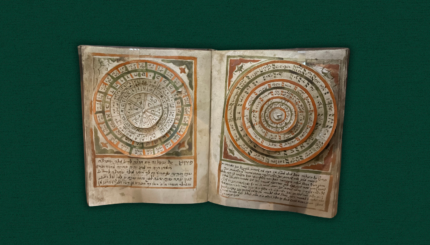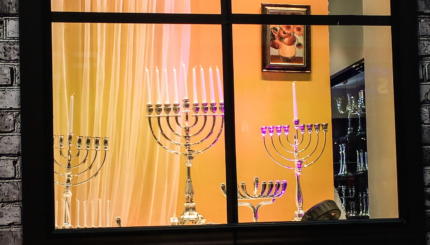The Ushpizin custom, in which an ancient Jewish luminary is invited into the sukkah as a guest, is performed each night of the holiday of Sukkot.
The text of the service is as follows:
תִּיבוּ תִּיבוּ אוּשְׁפִּיזִין עִילָאִין, תִּיבוּ תִּיבוּ אוּשְׁפִּיזִין קַדִּישִׁין, תִּיבוּ תִּיבוּ אוּשְׁפִּיזִין דִמְהֵימְנוּתָא, זַכָּאָה חוּלְקֵיהון דְיִשרָאֵל דִּכְתִיב כִּי חֵלֶק ה’ עַמּו יַעֲקב חֶבֶל נַחֲלָתו:
Tee-voo tee-voo ush-pee-zinn ee-lah-een, tee-voo tee-voo ush-pee-zin kah-dee-sheen, tee-voo tee-voo ush-pee-zin dim-hay-mih-noo-tah, zah-kah-ahh chool-hay-hone dih-yis-rah-ell, dich-teev kee chay-lek ahh-doe-nay ahh-moe yah-ahh-kove cheh-vell nah-chah-lah-toe
With your help, My Jewish Learning can provide endless opportunities for learning, connection and discovery.
Sit, sit, [you] lofty guests; sit, sit [you] holy guests; sit, sit [you] guests of faith. Worthy is Israel’s portion, as it is written (Deuteronomy 32:9), “For the Lord’s portion is His people, Jacob His allotment.”
יְהִי רָצון מִלְּפָנֶיךָ ה’ אֱלהַי וֵאלהֵי אֲבותַי שֶׁתַּשְׁרֶה שְׁכִינָתְךָ בּינֵינוּ וְתִפְרוס עָלֵינוּ סֻכַּת שְׁלומֶךָ בִּזְכוּת מִצְוַת סֻכָּה שֶׁאֲנַחְנוּ מְקַיְּמִין לְיַחְדָא שְׁמָא דְקוּדְשָׁא בְּרִיךְ הוּא וּשְׁכִינְתֵּהּ בִּדְחִילוּ וּרְחִימוּ לְיַחֲדָא שֵׁם י”ה בו”ה בְּיִחוּדָא שְׁלִים בְּשֵׁם כָּל יִשרָאֵל, וּלְהַקִּיף אותָם מִזִּיו כְּבודֶךָ הַקָּדושׁ וְהַטָּהור נָטוּי עַל רָאשֵׁיהֶם מִלְּמָעְלָה כְּנֶשֶׁר יָעִיר קִנּו, וּמִשָּׁם יוּשְׁפַּע שֶׁפַע הַחַיִּים לְעַבְדֶּךָ פב”פ אֲמָתֶךָ. וּבִזְכוּת צֵאתִי מִבֵּיתִי הַחוּצָה וְדֶרֶךְ מִצְותֶיךָ אָרוּצָה יֵחָשֵׁב לִי זאת כְּאִלּוּ הִרְחַקְתִּי נְדוד, וְהֶרֶב כַּבְּסֵנִי מֵעֲונִי וּמֵחַטָּאתִי טַהֲרֵנִי, וּמֵאוּשְׁפִּיזִין עִלָּאִין אוּשְׁפִּיזִין דִּמְהֵימְנוּתָא תִּהְיֶינָה אָזְנֶיךָ קַשּׁוּבות רַב בְּרָכות, וְלָרְעֵבִים גַּם צְמֵאִים תֶּן לַחְמָם וּמֵימָם הַנֶּאֱמָנִים, וְתִתֶּן לִי זְכוּת לָשֶׁבֶת וְלַחֲסות בְּסֵתֶר צֵל כְּנָפֶךָ בְּעֵת פְּטִירָתִי מִן הָעולָם, וְלַחֲסות מִזֶּרֶם וּמִמָּטָר, כִּי תַמְטִיר עַל רְשָׁעִים פַּחִים, וּתְהֵא חֲשׁוּבָה מִצְוַת סֻכָּה זוּ שֶׁאֲנִי מְקַיֵּם כְּאִלּוּ קִיַּמְתִּיהָ בְּכָל פְּרָטֶיהָ וְדִקְדּוּקֶיהָ וּתְנָאֶיהָ וְכָל מִצְות הַתְּלוּיִם בָּהּ. וְתֵיטִיב לָנוּ הַחֲתִימָה, וּתְזַכֵּנוּ לֵישֵׁב יָמִים רַבִּים עַל הָאֲדָמָה אַדְמַת קדֶשׁ בַּעֲבודָתֶךָ וּבְיִרְאָתֶךָ. בָּרוּךְ ה’ לְעולָם אָמֵן וְאָמֵן:
Yih-hee rah-tzone mil-fah-neh-chah ahh-doe-nay ehh-low-hai veh-low-hay ahh-voe-tay she-tosh-reh shih-chee-not-chah bay-nay-noo vih-tiff-rose ahh-lay-noo soo-kat shih-low-meh-chah biz-choot mitz-vot soo-kah sheh-ahh-nach-noo mih-kie-meen lih-yach-dah shih-mah dih-kood-shah b’reech hoo ooh-shih-cheen-tay bid-chee-loo ooh-rih-chee-moo lih-yah-chah-dah shame bih-yee-choo-dah shih-leem bih-shame kol yis-rah-ell ooh-lih-hah-keef owe-tam mee-zeen kih-voe-deh-chah hah-kah-dosh vih-hah-tah-hore nah-toy ahl rah-shay-hem mil-mah-lah kih-neh-sher yah-ear kee-noo ooh-mee-sham yoosh-pah sheh-fah hah-chah-yeem lih-ahv-deh-chah ahh-mah-teh-chah ooh-biz-choot tzay-tee mee-bay-tee hah-choo-tzah vih-deh-rech mitzh-voe-teh-chah ahh-roo-tzah yay-chah-shave lee zote kih-ee-loo hear-chak-tee nih-dode vih-heh-rev kahb-say-nee may-ahh-voe-nee ooh-may-chah-tah-tee tah-hah-ray-nee ooh-may-ush-pee-zeen ee-lah-een ush-pee-zeen dim-hame-noo-tah tee-yeh-nah oz-neh-chah hah-shoo-vote rahv bih-rah-chote vih-lah-rih-ayy-veem gahm tzih-may-eem ten lach-mam ooh-may-mom hah-neh-ehh-mah-neem vih-tee-tane lee zih-choot lah-sheh-vet vih-lah-chah-sote bih-say-terr tzale kih-nah-feh-chah bih-ate pih-tee-rah-tee min hah-owe-lam vih-lah-chah-sote mee-zeh-remm ooh-mee-mah-tar kee tom-tear all rih-shah-eem pah-cheem, ooh-tih-hay hah-shoo-vah mitz-vat soo-kah zoo sheh-ahh-nee mih-kah-yame kih-ee-loo kee-yam-tee-hah bih-chole pih-rah-teh-hah vih-deek-doo-keh-hah ooh-tih-nah-ehh-hah vih-chole mitz-vote hah-tih-loo-yeem bah. vih-tay-teev lah-noo hah-chah-tee-mah ooh-tih-zah-kay-noo lay-shave yah-meem rah-beem ahl hah-ahh-dah-mah odd-maht koe-desh bah-ahh-voe-dah-teh-chah ooh-vih-year-ahh-teh-chah, bah-ruch ahh-doe-nay lih-owe-lam ahh-main vih-ahh-mainj
May it be Your will in front of You, Lord, my God and God of my fathers, that You have Your Divine Presence rest upon us, and that You spread out Your sukkah of peace upon us, in the merit of the commandment of sukkah that we are fulfilling in order to unify the name of the Holy One, blessed be He and His Divine Presence – with fear and love – to unify the name, Yod Hay, with Vav Hay on behalf of all of Israel; and to surround them with the radiance of Your holy and pure glory, spread over their heads above ‘like an eagle protecting his nest.’ And from there, may the flow of life flow to Your servant, [one’s name], the child of [one’s mother’s name], Your maidservant. And in the merit of my going out of my house – ‘I eagerly pursue Your commandments’ – let this be considered as if ‘I wandered far away’ (thus suffering the atonement of exile), and ‘wash me thoroughly of my iniquity and purify me of my sin.’ And ‘let Your ears pay heed’ to many blessings of the lofty guests, the guests of faith; and give the hungry, even the thirsty, their bread and their dependable water. And give me the merit to sit and be sheltered ‘in the hidden shade of Your wings,’ at the time of my leaving the world, and to be ‘sheltered from the torrential rain,’ when ‘You rain down blazing coals upon the wicked.’ And let this commandment of sukkah that I am fulfilling be considered as if I had fulfilled it with all of its details, its exact specifications, its conditions and all the commandments that depend upon it. And make the sealing [of judgement] good for us, and give us the merit to dwell many days upon the ground, the holy ground, in Your service and in Your awe. ‘Blessed is the Lord forever, Amen and Amen!’
On all nights say:
אֲזַמִין לִסְעוּדָתִי אוּשְׁפִּיזִין עִילָאִין אַבְרָהָם יִצְחָק יַעֲקב משֶׁה אַהֲרן יוסֵף וְדָּוִד
ahh-zah-meen lis-ooh-dah-tee ush-pee-zinn ee-lah-een av-rah-ham yitz-chak yah-ahh-kove mow-sheh ahh-hah-rone yoe-safe vih-dah-veed
I am inviting the lofty guests, Abraham, Isaac, Jacob, Moses, Aaron, Joseph and David.
On the first night:
בְּמָטֵי מִינָךְ אַבְרָהָם אוּשְׁפִּיזִי עִילָאִי דְיַתְבֵי עִמִּי וְעִמָּךְ כָּל אוּשְׁפִּיזֵי עִילָאִי יִצְחָק יַעֲקב משֶׁה אַהֲרן יוסֵף וְדָּוִד
bim-tay mee-nach avv-rah-ham ush-pee-zay ee-lah-ee dih-yat-vay ee-mee vih-eeh-moch kole ush-pee-zay ee-lah-ee yitz-chak yah-ahh-kove mow-sheh ahh-hah-rone yoe-safe vih-dah-veed
If you please, Abraham, my lofty guest, may all of the exalted guests – Isaac, Jacob, Moses, Aaron, Joseph and David – sit with me and you.
On the second night:
בְּמָטֵי מִינָךְ יִצְחָק אוּשְׁפִּיזִי עִילָאִי דְיַתְבֵי עִמִּי וְעִמָּךְ כָּל אוּשְׁפִּיזֵי עִילָאִי אַבְרָהָם יַעֲקב משֶׁה אַהֲרן יוסֵף וְדָּוִד
bim-tay mee-nach yitz-chak ush-pee-zay ee-lah-ee dih-yat-vay ee-mee vih-eeh-moch kole ush-pee-zay ee-lah-ee avv-rah-ham yah-ahh-kove mow-sheh ahh-hah-rone yoe-safe vih-dah-veed
If you please, Isaac, my lofty guest, let all of the exalted guests – Abraham, Jacob, Moses, Aaron, Joseph and David – sit with me and with you.
On the third night:
בְּמָטֵי מִינָךְ יַעֲקב אוּשְׁפִּיזִי עִילָאִי דְיַתְבֵי עִמִּי וְעִמָּךְ כָּל אוּשְׁפִּיזֵי עִילָאִי אַבְרָהָם יִצְחָק משֶׁה אַהֲרן יוסֵף וְדָּוִד
bim-tay mee-nach yah-ahh-kove ush-pee-zay ee-lah-ee dih-yat-vay ee-mee vih-eeh-moch kole ush-pee-zay ee-lah-ee avv-rah-ham yitz-chak mow-sheh ahh-hah-rone yoe-safe vih-dah-veed
If you please, Jacob, my lofty guest, may all of the exalted guests – Abraham, Isaac, Moses, Aaron, Joseph and David – sit with me and you.
On the fourth day night:
בְּמָטֵי מִינָךְ משֶׁה אוּשְׁפִּיזִי עִילָאִי דְיַתְבֵי עִמִּי וְעִמָּךְ כָּל אוּשְׁפִּיזֵי עִילָאִי אַבְרָהָם יִצְחָק יַעֲקב אַהֲרן יוסֵף וְדָּוִד
bim-tay mee-nach mow-sheh ush-pee-zay ee-lah-ee dih-yat-vay ee-mee vih-eeh-moch kole ush-pee-zay ee-lah-ee avv-rah-ham yitz-chak yah-ahh-kove ahh-hah-rone yoe-safe vih-dah-veed
If you please, Moses, my lofty guest, may all of the exalted guests – Abraham, Isaac, Jacob, Aaron, Joseph and David – sit with me and you.
On the fifth night:
בְּמָטֵי מִינָךְ אַהֲרן אוּשְׁפִּיזִי עִילָאִי דְיַתְבֵי עִמִּי וְעִמָּךְ כָּל אוּשְׁפִּיזֵי עִילָאִי אַבְרָהָם יִצְחָק יַעֲקב משֶׁה יוסֵף וְדָּוִד
bim-tay mee-nach ahh-hah-rone ush-pee-zay ee-lah-ee dih-yat-vay ee-mee vih-eeh-moch kole ush-pee-zay ee-lah-ee avv-rah-ham yitz-chak yah-ahh-kove mow-sheh yoe-safe vih-dah-veed
If you please, Aaron, my lofty guest, may all of the exalted guests – Abraham, Isaac, Jacob, Moses, Joseph and David – sit with me and you.
On the sixth night:
בְּמָטֵי מִינָךְ יוסֵף אוּשְׁפִּיזִי עִילָאִי דְיַתְבֵי עִמִּי וְעִמָּךְ כָּל אוּשְׁפִּיזֵי עִילָאִי אַבְרָהָם יִצְחָק יַעֲקב משֶׁה אַהֲרן וְדָּוִד
bim-tay mee-nach yoe-safe ush-pee-zay ee-lah-ee dih-yat-vay ee-mee vih-eeh-moch kole ush-pee-zay ee-lah-ee avv-rah-ham yitz-chak yah-ahh-kove mow-sheh ahh-hah-rone vih-dah-veed
If you please, Joseph, my lofty guest, may all of the exalted guests – Abraham, Isaac, Jacob, Moses, Aaron, and David – sit with me and you.
On the seventh night:
בְּמָטֵי מִינָךְ דָּוִד אוּשְׁפִּיזִי עִילָאִי דְיַתְבֵי עִמִּי וְעִמָּךְ כָּל אוּשְׁפִּיזֵי עִילָאִי אַבְרָהָם יִצְחָק יַעֲקב משֶׁה אַהֲרן וְיוסֵף
bim-tay mee-nach dah-veed ee-lah-ee dih-yat-vay ee-mee vih-eeh-moch kole ush-pee-zay ee-lah-ee avv-rah-ham yitz-chak yah-ahh-kove mow-sheh ahh-hah-rone vih-yoe-safe ush-pee-zay
If you please, David, my lofty guest, may all of the exalted guests – Abraham, Isaac, Jacob, Moses, Aaron and Joseph – sit with me and you.



